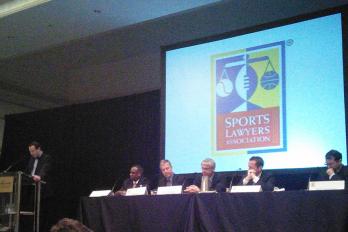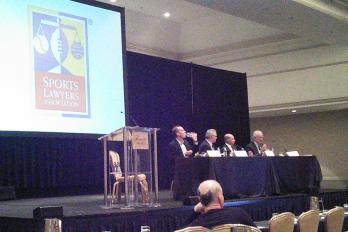Sports Fellows Attend 40th Annual Sports Lawyers Association Annual Meeting
May 20, 2014
By Sam Ehrlich ‘14
From May 15-17, Jason Barmasse (3L) and I had the distinct pleasure of attending the 40th Annual Sports Lawyers Association (SLA) annual meeting at the Fairmont Hotel in Chicago, IL. At the conference, many of the top lawyers, practitioners, students and professors in the sports law field gather for three days of intense networking and interesting discussion on current legal issues in sports.
While this was my third year in a row attending the conference (including last year in Atlanta and 2012 in San Diego), it was Jason’s first year. While Jason was not sure what to expect, he was excited to be in the same room with over 800 lawyers and students who either work or are planning to work in sports law. Said Jason, “I wasn’t sure what kind of environment I was about to walk into. It was good that I went with someone who I not only knew, but who had experience attending the conference for a few years before.”
Some of the featured panels this year were “American Pro Sports Franchises in Europe and Asia: Potential and Pitfalls,” “The Current Issues Facing Team General Counsel,” and “Negotiating and Drafting Entertainment Deals for Athlete Clients.” One notable panel, “Impact of Biogenesis and Lance Armstrong Cases on Drug Testing in Sports,” featured US Anti-Doping Agency CEO Travis Tygart, ESPN Legal Analyst Lester Munson and longtime sports doping attorney Howard Jacobs, as well as Court of Arbitration of Sport secretary general Matthieu Reeb, who came all the way from Switzerland.
My favorite panel was the Thursday evening panel on “The Evolving Legal Landscape of College Athletics,” which featured athlete-advocates Timothy Epstein from SmithAmudsen and Marc Isenberg from A-Game. It also included Professors Warren Zola of Boston College, Matthew Mitten of Marquette Law School and Gary Roberts of Indiana University Robert H. McKinney School of Law. However, the highlight of this particular panel was NCAA General Counsel Donald Remy, who has the unenviable task of defending an organization harangued in recent years by criticism and lawsuits. Mr. Remy did an admirable job defending the NCAA in front of the group of lawyers, even taking a number of pestering questions from Wm. David Cornwell of Gordon & Rees (who represented Barry Bonds and Alex Rodriguez in their legal troubles).
According to Jason, the conference turned out even better than he expected. “For a guy who just finished off a month of finals studying and test taking, sitting in a conference for about 6-7 hours a day and listening to legal disputes didn’t exactly sound appealing at the time,” he said. “But the panels really were pretty incredible, and completely relevant to everything in legal discussion for sports at this point in time; from the outlook on the future of NCAA structure, to international ambush marketing, to ‘doping’.”
Jason even had the chance to meet a local sports law icon. Jason is from Westlake Village, CA, which also happens to be the location of doping panelist Howard Jacobs’ office. Jason noticed the coincidence while researching the panelists beforehand, and remembered seeing him at a panel at Pepperdine Law School. Jason was trying to figure out how to approach Jacobs when Jacobs just happened to sit next to him at the Friday luncheon.
For Jason, it was a perfect situation. “You never know what can happen at one of these events, who you may talk to, people in attendance you actually know from whatever prior engagement,” he said. “It’s always good to try to talk to the people who you’re particularly interested in meeting or networking with, but sometimes it’s not always practical at events this big. But sometimes just showing up is enough to get lucky, and accelerate the chain of networking.”
All in all, the conference was incredibly interesting and gave us the opportunity to meet some really fascinating people in the sports law field. As Jason said, “It’s a terrific event to create connections and network. At the very least, the panels are incredible; filled with all-star moderators and panelists alike covering all relevant topics in the field of sports law today.” And really, every time we looked around, it was almost shocking to see names on name tags that we recognized from ESPN, law review articles, and casebooks. The sports law industry is very small. Having the opportunity to network with 840 other sports lawyers will be invaluable to furthering our careers upon graduating from Thomas Jefferson School of Law.

